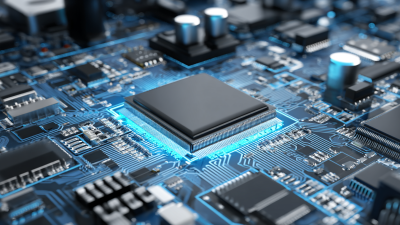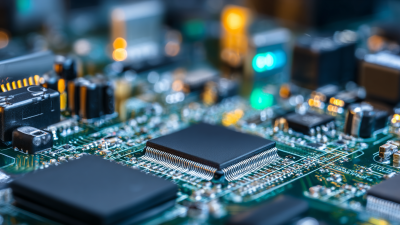In the rapidly evolving landscape of modern electronics, the role of printed circuit board assembly (PCBA) cannot be overstated. As the backbone of virtually all electronic devices, PCBA facilitates the interconnection of various components, enabling the complex functionalities we often take for granted. The importance of this process transcends mere manufacturing; it encompasses precision engineering, quality control, and innovative design integration. As electronic devices become increasingly sophisticated, the demand for reliable and efficient printed circuit board assembly continues to grow, making it a critical focus for manufacturers seeking to stay competitive in the market. This exploration of PCBA will highlight its significance, the intricacies involved in the assembly process, and its impact on the performance and longevity of electronic products, illustrating why understanding PCBA is essential for anyone involved in the electronics industry.

 Printed Circuit Board Assembly (PCBA) plays a critical role in the functionality of electronic devices. As the backbone of modern electronics, PCBA serves as a platform where various electronic components are integrated and interconnected. This assembly process involves soldering components such as resistors, capacitors, and integrated circuits onto a printed circuit board, creating a complete and workable electronic system. The precision and quality of this assembly directly impact the reliability and performance of the end device, making it essential for manufacturers to adhere to stringent quality standards.
Printed Circuit Board Assembly (PCBA) plays a critical role in the functionality of electronic devices. As the backbone of modern electronics, PCBA serves as a platform where various electronic components are integrated and interconnected. This assembly process involves soldering components such as resistors, capacitors, and integrated circuits onto a printed circuit board, creating a complete and workable electronic system. The precision and quality of this assembly directly impact the reliability and performance of the end device, making it essential for manufacturers to adhere to stringent quality standards.
Moreover, PCBA influences the overall design and efficiency of electronic devices. With the growing demand for miniaturization and enhanced functionality, advanced PCA techniques are employed to optimize circuit layouts and component placements. This not only helps in saving space but also improves signal integrity and reduces electromagnetic interference. As devices continue to evolve, the importance of PCBA in ensuring seamless operation and enhanced performance cannot be overstated, making it a vital component in the development of innovative electronic solutions.
The significance of printed circuit board (PCB) assembly in modern electronics cannot be understated, as it plays a critical role in enhancing the efficiency and effectiveness of electronic production. One of the primary benefits of PCB assembly is its ability to streamline the manufacturing process. By integrating various electronic components into a single, compact board, manufacturers can reduce the assembly time and minimize potential errors. This level of integration not only leads to faster production cycles but also helps in lowering labor costs and material wastage.
Furthermore, PCB assembly contributes to improved product performance and reliability. With the precise placement and soldering of components, manufacturers can ensure that connections are robust and that the overall quality of the electronic devices is maintained. Advanced assembly techniques, such as surface mount technology (SMT), allow for even smaller and more complex designs without compromising functionality. This evolution in PCB assembly also facilitates the development of innovative electronics, catering to the increasing demand for miniaturization and efficiency in various applications, from consumer gadgets to industrial machinery.
The rapid advancements in technology have significantly transformed the PCB assembly processes within modern electronics. Advanced technologies, such as automation and artificial intelligence, have led to increased efficiency and precision in assembly techniques. According to a recent report by the IPC, the global PCB market is expected to grow to $75 billion by 2026, highlighting the crucial role that modern assembly technologies play in meeting the rising demand. Automation not only reduces human error but also accelerates production times, allowing companies to remain competitive in an ever-evolving landscape.
Tips: When considering PCB assembly, invest in automated inspection technologies. These can enhance quality control and ensure the reliability of your products. Additionally, incorporating AI-driven analytics can optimize production workflows and reduce material waste.
Furthermore, advanced soldering techniques, such as selective soldering and wave soldering, are becoming standard practices in PCB assembly. These methods have shown to increase the longevity and performance of electronic devices. The latest findings from the Research and Markets reports indicate that organizations utilizing these advanced soldering methods experience a 30% decrease in defect rates in their final products. Adopting these technologies is essential for manufacturers looking to enhance their assembly processes and deliver superior electronic solutions.
The assembly of printed circuit boards (PCBs) is crucial in modern electronics, as it impacts the performance and reliability of various devices. However, manufacturers face several challenges in PCB assembly that can hinder production efficiency. For instance, managing the complexity of designs with increasingly dense component layouts can lead to higher rates of assembly errors. Additionally, ensuring proper thermal management remains a challenge due to the miniaturization of electronic components.

Tip: To address assembly errors, manufacturers should invest in advanced automation tools that improve precision and reduce the likelihood of human error. Regular training for assembly line workers can also enhance their skills in handling complex tasks.
Another significant challenge is dealing with the materials used in PCB construction. The mismatch of thermal expansion rates between the PCB and its components can lead to warping and cracking, jeopardizing the integrity of the final product. Manufacturers are adopting innovative materials, such as low-expansion substrates, to mitigate these issues effectively.
Tip: Implementing thorough testing procedures, including thermal cycling tests, can help identify potential weaknesses early in the development process, ensuring higher reliability in the final assembled PCBs.
The future of printed circuit board (PCB) assembly in the electronics industry is poised for significant transformation, driven by emerging trends and technological advancements. Among the most notable trends is the increasing integration of artificial intelligence (AI) in manufacturing processes. This shift not only streamlines production but also enhances quality control, paving the way for smarter, more efficient operations. As companies invest more in AI, the sector is witnessing a growing concentration of market power, benefiting only a handful of major players, while smaller firms grapple with the challenge of keeping up.
Sustainability has also come to the forefront, with manufacturers seeking innovative approaches to reduce e-waste and optimize resource use. The focus on greener manufacturing practices will influence the entire supply chain, from design to disposal. As businesses adapt to these changes, newer entrants in the field will emerge, raising the standard for environmental responsibility and potentially reshaping consumer expectations. Furthermore, as countries like India ramp up semiconductor production, the dynamics of global supply chains are shifting, underscoring the criticality of PCB assembly in not only supporting electronics but also fostering sustainable development in the industry.






| Cookie | Duration | Description |
|---|---|---|
| cookielawinfo-checkbox-analytics | 11 months | This cookie is set by GDPR Cookie Consent plugin. The cookie is used to store the user consent for the cookies in the category "Analytics". |
| cookielawinfo-checkbox-functional | 11 months | The cookie is set by GDPR cookie consent to record the user consent for the cookies in the category "Functional". |
| cookielawinfo-checkbox-necessary | 11 months | This cookie is set by GDPR Cookie Consent plugin. The cookies is used to store the user consent for the cookies in the category "Necessary". |
| cookielawinfo-checkbox-others | 11 months | This cookie is set by GDPR Cookie Consent plugin. The cookie is used to store the user consent for the cookies in the category "Other. |
| cookielawinfo-checkbox-performance | 11 months | This cookie is set by GDPR Cookie Consent plugin. The cookie is used to store the user consent for the cookies in the category "Performance". |
| viewed_cookie_policy | 11 months | The cookie is set by the GDPR Cookie Consent plugin and is used to store whether or not user has consented to the use of cookies. It does not store any personal data. |